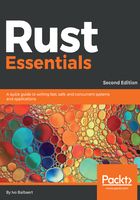
Scope of a variable and shadowing
All variables defined in the program bindings.rs have local scope delimited by the { } of the function which happens to be the main() function here, but this applies to any function. After the ending, }, they go out of scope and their memory allocation is freed.
We can even make a more limited scope inside a function by defining a code block as all code contained within a pair of curly braces { }, as in the following snippet:
// see Chapter 2/code/scope.rs
fn main() {
let outer = 42;
{ // start of code block
let inner = 3.14;
println!("block variable: {}", inner);
let outer = 99; // shadows the first outer variable
println!("block variable outer: {}", outer);
} // end of code block
println!("outer variable: {}", outer);
}
The preceding code gives the following output:
block variable: 3.14
block variable outer: 99
outer variable: 42
A variable defined in the block (like inner) is only known inside that block. A variable in the block can also have the same name as a variable in an enclosing scope (like outer), which is replaced (shadowed) by the block variable until the block ends. What do you expect when you try to print out inner after the block? Try it out.
Why would you want to use a code block? In the section Expressions, we will see that a code block can return a value that can be bound to a variable with the let binding. A code block can also be empty as { }.